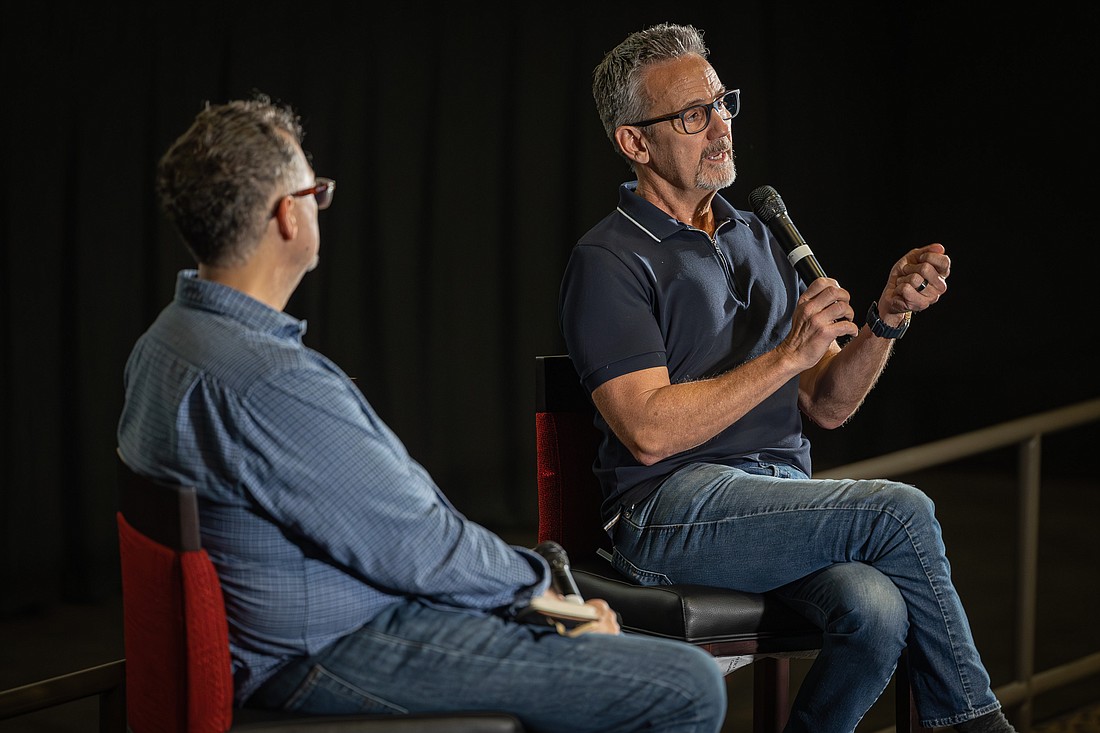- April 16, 2025
-
-
Loading

Loading

One of Marvel Studios' top executives recently visited St. Petersburg for a local film festival, during which he revealed how the movie studio giant has been successful over the years.
Some might say the screen came to life inside Theater No. 1 at the AMC Sundial 12 on April 28, at the Sunscreen Film Festival. That's where an audience of nearly 150 writers, directors, film industry professionals and more sat listening for advice from Marvel Vice President of Physical Production Mitchell Bell.
Throughout Bell’s career, most of which has been spent at Marvel, there’s something he’s always done that he says has made all the difference for his rise in the field. And he encourages those starting out in the industry to follow the same advice. It's also pertinent advice for people seeking to advance in just about any industry.
“I said ‘yes’ to everything,” he says. “The best choices I made in my career were the ones that scared that shit out of me. If something scares you, do it.”
Bell moved to Los Angeles in the early 90s from Colorado after his sister, who was a costumes designer at the time, convinced him.
“I had absolutely no idea what I wanted to do,” he says after graduating college from Colorado State University. He thought he would end up in advertising, but then he got an interview at Imagine Entertainment, a film and television production company run by Hollywood A-listers Ron Howard, director, and Brian Glazer, producer. Bell was the production assistant for three years doing all of the things like “getting Ron and Brian Glazer’s coffee, washing their cars, getting their mail.”
After establishing a network in L.A. through freelance work, Bell had gotten to know a number of executives at Marvel. Matter-of-factly Bell says there was simply an interview and then an offer.
“Timing is everything,” he adds. He joined when the production studio was producing Iron Man 2. That was before the studio truly became the giant it is today. “Every movie we did, it just got bigger and bigger,” he says.
But there wasn’t time to celebrate.
“The thing about Marvel is we’re always looking at the next thing,” he says. “Your head’s down and just moving forward.”
Highlights from the conversation with Bell, moderated by Dave DeBorde, the festival’s education director, include the following nuggets:
When Bell first got to Marvel, the studio was finding lesser known actors. Now those are big names in the industry thanks to the company’s growth and influence.
Now, Bell says, “people want to work for us.”
But that growth and recognition comes at a cost.
Chadwick Boseman died from colon cancer in 2020 before production of the second Black Panther movie. Bell says that was a time when the studio had to carefully choose its next step and spoke to the challenge studios face when it comes to making a movie rewatchable.
“Unfortunately, it was a little too emotional,” he says of Wakanda Forever, the second installment of the Black Panther franchise. “You want to walk out of the movies and say, ‘This was fun,’ but when you have a heavy movie like that, it’s like walking out like, ‘That was amazing, but I can’t see it again.’”
That move, though necessary due to Boseman’s platform as an actor, hurt the studio’s profits.
When up against that rewatchability aspect of getting viewers to rewatch the movie through means of buying a physical copy, signing up for a streaming service or even visiting the movie theater a second time, there’s certain aspects Bell considers.
The first thing is ensuring an individual who isn’t the biggest nerd can enjoy a Marvel movie. Once a movie can stand on its own, there’s a process of hiding “Easter eggs” for Marvel fans so they have to go back and watch it again.
Another part of the rewatchability aspect is warding off “superhero fatigue,” the term for viewers who are bored of superhero movies. Bell suggests subgenres are helpful.
“Captain America: The Winter Soldier,” for example, included hints of a thriller. “You have to make sure the subgenres are strong enough to hold on their own,” he says.
Normally, businesses don’t really cheer for their competitors. With Marvel, Bell is the opposite.
One of the longstanding competitions in the entertainment industry is the one between Marvel and DC. But that doesn’t mean Marvel is looking for their opponents' demise.
“We want DC to do well because the genre itself needs to be healthy,” Bell says. “You need to have good movies across the board otherwise it hurts everybody.”
The reason is because the average person, he says, doesn’t know the difference between DC movies and Marvel movies. They just know it’s a superhero movie.
Marvel, like many other companies in scores of industries, has been testing ChatGPT capabilities to see what the future may hold for the film industry.
Until ChatGPT and AI, Bell, for the most part, says he pretty much knew what works and doesn’t when it comes to filming. That's about to shift.
“Technology is going to change what we do,” he says. “I’m curious what AI is going to bring to filming.”
For instance, he says the technology may allow for bigger movies to be made on smaller budgets as AI and ChatGPT stay relatively inexpensive.